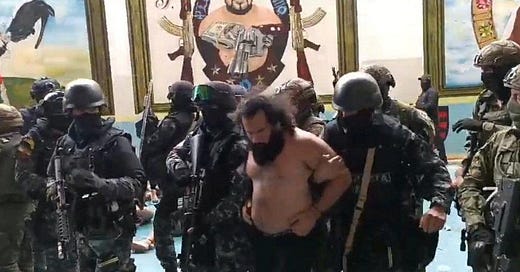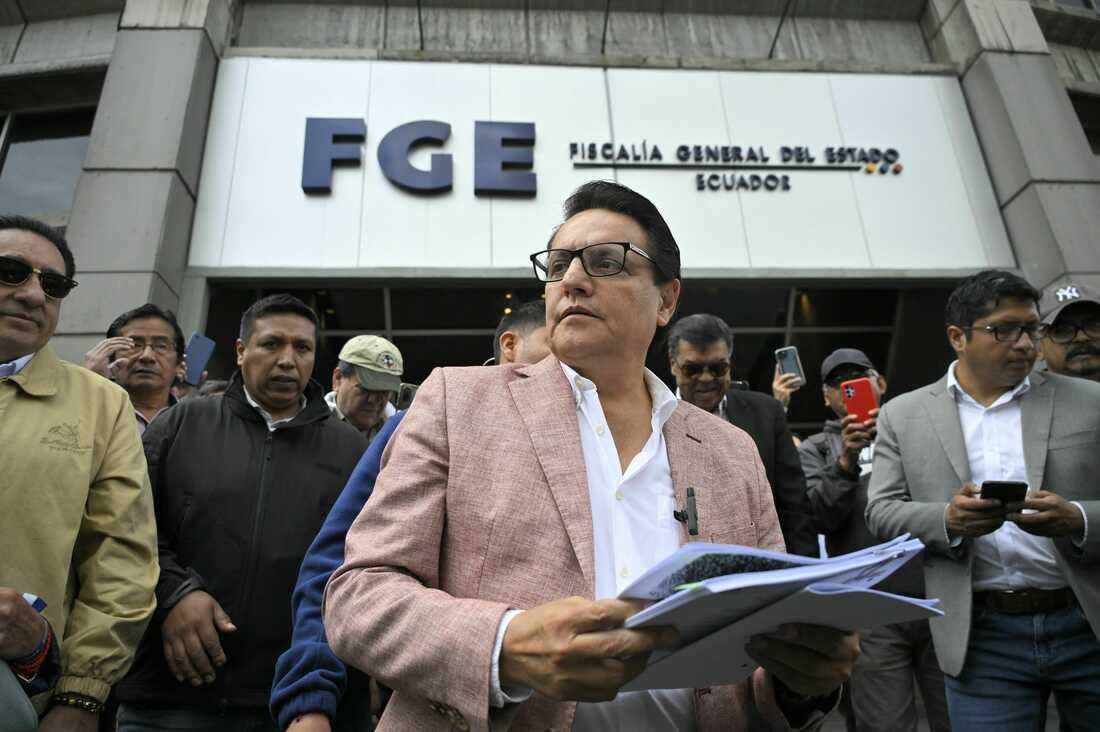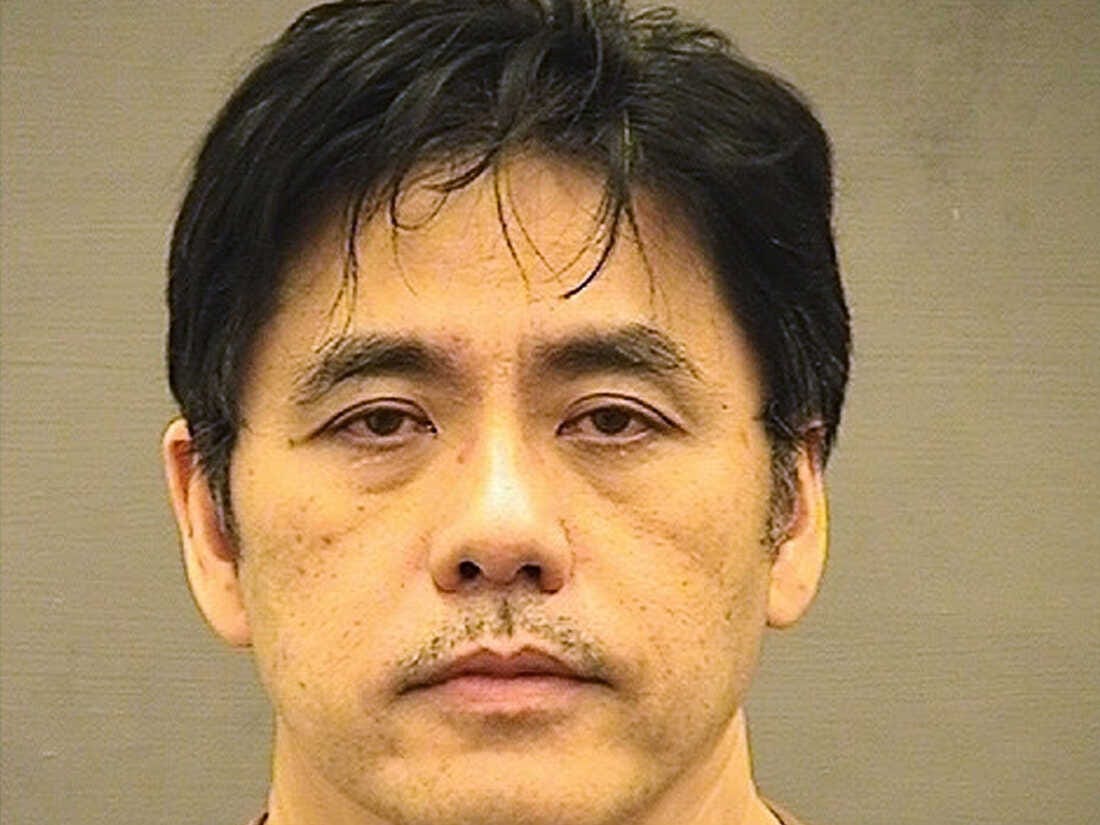Note from Lethal Minds:
Bulletin From The Borderlands is a joint project between Lethal Minds and some of the most talented OSINT analysts and independent journalists working today. Our goal is to provide you with a clear, accurate, and informative view of the world, free from censorship or bias. The Bulletin will bring you the facts, our analysis, and our evidence. We hope you find our work helps you better understand the complicated and increasingly volatile world in which we live.
Be informed, be prepared, be lethal.
The Bulletin Team:
Kitbag Conversations : A team of retired Marine and Army Intelligence analysts and the founders of the Croatoan Report and Kitbag Conversations, foreign policy and security affairs podcasts. The Team Leader for Bulletin From The Borderlands.
Analyze Educate : Brodie Kirkpatrick (Analyze & Educate) is a Marine Corps infantry veteran. He attends San Jose State University and is pursuing a Bachelor’s Degree in Political Science. He runs Analyze & Educate, a podcast and associated social media pages discussing geopolitics, armed conflicts, news, and history. In his capacity with Lethal Minds he is the assistant lead for the Bulletin From the Borderlands, Americas Desk chief, and an editor.
Meridian News : Meridian News is a project dedicated to sharing and aggregating open source intelligence, stories from individuals experiencing history, and amplifying underreported global news.
Sino Talk : Sino Talk is China watcher with extensive experience living and studying in China. In another life, he was a Marine intelligence analyst.
The Expeditionary Intelligence Group : The Expeditionary Intelligence Group Instagram page is a project delivering flash news utilizing open-source intelligence combined with human asset contributions and geographic intelligence to provide the general public with objective bias-free global news that tells the whole story based on the facts and on-the-ground insights they feel are missing from a lot of mainstream news reporting.
S2 Forward : A serving US Marine and Intelligence analyst, S2 Forward is focused primarily on the Mid East and Central Asia.
Calisto Report: The Calisto Report is an OSINT project dedicated to delivering timely open source analysis and conflict reporting, and chronicling global events
The Defense Bulletin: Defense Bulletin is run by John M Larrier. As a civilian, I’ve closely followed strategic developments for close to a decade, but “launched” the Bulletin during the pullout in Afghanistan due to the extreme nature of the misinformation I saw my peers as well as others reading into. The lacuna that the general populace has about these now very prevalent subjects is the stated goal for Defense Bulletin
ALCON S2: A veteran of the New Zealand military intelligence community, if it walks, talks, or crawls in Asia, ALCON S2 knows about it. Cole is the preeminent source of OSINT for the Oceania and South East Asia region.
Sponsors
The Bulletin is brought you to by PB Abbate.
As you likely know, Lethal Minds Journal shares common ancestry with Patrol Base Abbate, one of the most impactful veteran’s outreach organizations in America. One of the ways in which we connect is through a love of the written word, a belief in the power of good writing to help give a voice to people who need to be heard, and a desire to help service members and vets connect through self-expression. This summer, Sebastian Junger, award winning writer of War, Tribe, and Freedom (amongst others), will join the Patrol Base Abbate Book Club in Montana for their annual Return to Base Program. From June 22nd-26th, members of the Book Club will spend a few days discussing literature while they reconnect with nature and other veterans at Patrol Base Abbate’s PB in Thompson Falls, Montana. Details about eligibility are at https://www.pbabbate.org/rtb-application-0-0.
In This Issue:
The Americas : Covered in this issue by Brodie Kirkpatrick (Analyze & Educate).
As Ecuador prepares for a general election this month, one of the eight presidential candidates is assassinated while leaving a campaign rally. This event underscores the wave of violence being felt by Ecuadorians in recent years. In the United States, two Navy petty officers are arrested on the allegations that they have been spying on behalf of the People’s Republic of China. These indictments highlight the efforts of Chinese intelligence agents to leverage the ancestral ties of Chinese-Americans for espionage purposes.
Europe : Covered in this issue by Meridian News and Defense Bulletin
Tensions are flaring in the disputed Nagorno-Karabakh region as Armenia raises concerns of a mounting humanitarian crisis due to Azerbaijan’s control over a key corridor used for aid in the region. Ethnic Armenians make up the majority of the population in the disputed land, currently controlled by Azerbaijan. On top of it all, experts have raised fears of ethnic cleansing occuring in the region soon based on the two nation’s historical conflict amidst other signs. Additionally, a Russian organization of state-sponsored hackers known as “SandWorm” have been working diligently to infect Ukrainian technology used on the frontlines with malware. Fortunately for Ukraine, the malware has only had minor success, while providing valuable insight into the type of information the Russians are looking for to give them the upper hand.
East Asia and Oceania: Covered in this issue by Sino Talk and ALCON S2
The Taiwanese Vice President William Lai met with Taiwanese groups in New York City as began his trip to attend the inauguration of the President of Paraguay. China reportedly developed a breakthrough regarding laser weapons systems with a new cooling system that eliminates the buildup of waste heat and increases engagement times. Japan and the United States announced they will begin joint development of hypersonic missile interceptors capable of destroying hypersonic missiles developed by China, North Korea, and Russia. North Korean leader Kim Jong Un dismissed General Pak Su Il and appointed Ri Yong Gil as Chief of the General Staff and Vice Marshal. Kim also appointed, dismissed, and transferred several other top generals during the meeting.
The Philippine military said they will resist any attempt to tow the grounded BRP Sierra Madre from Second Thomas Shoal by another country and have procedures in place if such an event occurs. Vietnam and the Philippines will begin discussions to sign an agreement to increase maritime cooperation in the South China Sea that will bring stability to the region.
The Indian military will release a report about creating theater commands for the Indian military as a part of their modernization initiative. Sir Lanka is set to pass legislation that will finalize the country’s domestic debt restructuring plan. The Malabar joint military exercise between Australia, India, Japan, and the United States began near the city of Sydney and in eastern Australia and will end on August 21st. This iteration of the Malabar exercise marks the first time that Australia ever held the exercise in its country or waters.
Central Asia and the Mid East: Covered in this issue by S2 Fwd
With Imran Khan being removed by the Pakistani Senate, the Prime Minister and opposition has appointed the little known senator from Balochistan to act as the country's caretaker premier as Pakistan prepares for its upcoming elections.
Syrian rebel groups staged a series of violent attacks on Pro Assad Syrian Arab Army forces, resulting in multiple deaths. In the Black Sea, Russian naval marines boarded and inspected ships as part of their blockade of Ukrainian ports.
Africa: Covered in this issue by the Expeditionary Intelligence Group
Africa is still in the spotlight this week between renewed fighting and geopolitical instability in almost all regions of the continent.
North Africa: Clashes in Libya between the SDF and 444 brigade have begun to flare again, prompting civilians to shelter in place and flights to Tripoli to be diverted.
West Africa: The coup in Niger continues, however, for the first time the transitional government has agreed to engage in a dialogue with ECOWAS and has apologized for snubbing the Nigerian delegation earlier last week.
East Africa: Ethiopia declared a state of emergency in Amhara following issues with OLA, Shene, and Fano militia fighters refusing to integrate into the national security force. Additionally, the order of integration has upset a lot of Amharans and Oromians due to the alleged human rights abuse claims against the militia groups.
South Africa: Court documents and testimony from plaintiff in South Africa, points to possibility of South African SOF members being involved in kidnapping, assault, and other criminal activities prompting military officials to act on corruption issues.
The Big Points:
Defense Bulletin
The Highlight: Narcos Led Political Violence
Multiple political leaders across South America, to include two Ecuadorian presidential candidates, have been assassinated or involved in corruption charges. Narco led corruption and assassination campaigns have caused increased levels of instability across the region, and as several of these countries go into election cycles, and attempt to grapple with high crime rates, expect these assassinations to become more common.
See Also:
Former US President Donald Trump has been indicted by the state of Georgia on 41 charges, to include 104 violations of the RICO statute.
Russian military losses in Ukraine are confirmed to have surpassed 254,000.
Ukrainian forces secured a beachhead on the eastern bank of the Dniepr River, north of the city of Kherson.
Chinese coast guard vessels attacked a Philippine naval supply ship with water cannons and by attempting to ram the ship, in order to prevent its transit of Philippine waters, claimed by China.
The Americas
Brodie Kirkpatrick
Ecuador’s Fall From Grace
The South American nation of Ecuador has been overcome by violence and chaos in recent years. This issue has now grabbed the world’s attention after a political assassination shook up Ecuador's upcoming presidential election.
Crime Rates
Ecuador has historically been known as one of the safer countries in Latin America. However, that reputation has changed within the past few years amid a rise in criminal activity. Colombian and Mexican drug cartels have made their way into Ecuador and established ties with local street gangs, changing the country’s criminal landscape.
Many Eucadorians are concerned with the spike in crime around the nation. For decades, citizens in the country felt relatively safe in their neighborhoods; but now, Ecuador has the 4th highest homicide rate in Latin America. That is a rate even higher than Mexico, which has been embroiled in a decades-long drug war. In the country’s big cities, massacres, targeted attacks on police, and vehicle-borne IED attacks have become common. Particularly affected are the western provinces of Esmeraldas, Guayaquil, and Manta. This is due to ports in these areas being used by cartels.
According to Will Freeman, a fellow for Latin American studies at the Council on Foreign Relations, there are some points that must not be overlooked. COVID-19 ravaged the region, leaving poverty and hunger in its wake. This left criminal organizations with a pool of young men to recruit from. Additionally, Ecuador is between Peru and Colombia, the world’s two largest cocaine producers, leaving it vulnerable to crime that is associated with the drug trade. Lastly, Ecuador has a dollarized economy, making it much easier to launder money in the country. All of these factors make the country attractive to criminal enterprises looking to expand their operations.
President Guillermo Lasso has tried to stop the crime wave with little success. Earlier this year, he attempted to change Ecuador’s constitution to allow the extradition of those with links to transnational crime if they are facing charges in another country. The inspiration for this is the similar amendment that Colombia made to its constitution in 1997, which has been used to send criminals to the United States to face charges. However, Lasso’s amendment narrowly failed with a vote of 51% against.
Assassinations
This year has seen a trend of political assassinations. In January, mayoral candidate for the town of Salinas, Julio Cesar Farachio, was killed by a convicted drug trafficker. In February, Puerto López mayoral candidate Omar Menendez was shot and killed by multiple men when they raided a building that he was in with his campaign staffers. Menendez went on to be elected as the city’s mayor just hours after his death. In July, the Mayor of Manta, Agustín Intriago, was shot multiple times and killed by a lone gunman.
On August 9th, presidential candidate Fernando Villavicencio was assassinated while leaving a campaign rally in Quito. The rally was being held in the city’s financial district, in a building that once housed a school. According to his uncle, Galo Valencia, Villavicencio’s entourage “were just a few meters from the school when [they] were hit by a hail of about 40 bullets.” Valencia says his nephew was shot in the head three times. According to prosecutors working on the investigation, nine other people were injured in the attack, including a candidate for the National Assembly and two police officers. The assassin was also shot while engaging a security detail during the attack and later died from his injuries while in custody.
Villavicencio was a former journalist and representative in the National Assembly. He was running as a candidate for Movimiento Construye (MC25), a liberal democratic center-left to center-right political party. He was notably one of the few candidates to highlight alleged links between organized crime and members of the government; such as links between former President Rafael Correa and the Colombian Marxist-Leninist guerilla group FARC and claims of the Albanian mafia funding presidential candidates in 2021. The week before he was killed, Villavicencio claimed that he and his staff had been threatened by the leader of Los Choneros, an Ecuadorian cartel allied with the infamous Sinaloa Cartel from Mexico. Due to the allegation from Villavicencio, President Guillermo Lasso ordered the transfer of Los Choneros’ leader Adolfo “Fito” Macias to a maximum security prison on August 13th. Macias’ organization has a large presence in Ecuador’s prisons and his transfer was facilitated by 4,000 soldiers and law enforcement officers.
Shortly after the assassination, a video was posted on social media showing multiple men armed with rifles and wearing balaclavas. Them claimed responsibility for the killing on behalf of Los Lobos, another gang and rival of Los Choneros. However, another video surfaced hours later of men without face coverings claiming to also represent Los Lobos. Those men claimed that the gang was not connected to the killing and that the first video was recorded by the gang’s rivals to frame them.
Six suspects have been arrested in relation to the assassination, all of whom are Colombian nationals. Police say that all of the men have links to criminal groups and a judge has ordered them to remain in custody for the duration of the murder investigation. The raid that led to their arrests resulted in the confiscation of a rifle, a submachine gun, four pistols, three grenades, two boxes of ammunition, two motorbikes, and a stolen vehicle. The FBI has sent agents to assist Ecuador with the murder investigation at the request of Lasso.
Villavicencio’s killing led to President Lasso declaring a 60-day state of emergency in the country. However, Lasso confirmed that the presidential election will continue as planned on August 20th. Villavicencio’s party, MC25, has designated his running mate, environmental activist Andrea Gonzalez, to run in his place. At the time of his death, he was polling in the middle of eight candidates1.
US Sailors-China Spying
Early this month, two US Navy sailors were arrested by federal law enforcement and charged by the US Department of Justice for espionage on behalf of the People’s Republic of China. This highlights the trend of the Chinese government leveraging the ethnic ties of US citizens in order to gain information on subjects of interests.
August Indictments
On August 3rd, two indictments were announced by federal prosecutors in a joint press conference. Two US Navy sailors were charged in relation to alleged espionage on behalf of Chinese intelligence services in exchange for payments. Both of the men are naturalized US citizens originally from China and were stationed in California at the time of their arrests.
Petty Officer 2nd Class Jinchao “Patrick” Wei, 22, was charged in the Southern District of California. According to his indictment, he engaged in a conspiracy to send national defense information to a Chinese intelligence officer. At the time, Wei was assigned to the USS Essex amphibious assault ship out of San Diego. He is accused of passing as many as 50 sensitive vessel manuals to his handler while aboard the Essex. He also sent his intelligence officer photos of firearms, aircraft, and the personal information of US Marines preparing to take part in an upcoming joint military exercise. Wei allegedly passed information to Chinese intelligence as recently as two days before he was arrested.
He has allegedly been working with the Chinese government since February 2022. At a court hearing after his arrest, Assistant US Attorney Fred Sheppard alleged that Wei agreed to work for Chinese intelligence in part because of the encouragement of his mother. He claims that Wei’s mother encouraged him to spy on behalf of China while she hosted him for Christmas last year. According to Sheppard, her reasoning was that if he agreed to the work then it might help him in getting a job with the Chinese government later on in life. Sheppard did not reveal the woman’s name, who lives in Wisconsin.
Petty Officer Wencheng “Thomas” Zhao, 26, was charged in the Central District of California. At the time of his arrest he was stationed at Naval Base Ventura County. While at a naval base in Okinawa, Japan, Zhao sent his handler various diagrams and blueprints. He also sent the officer plans for a large-scale multinational military exercise. He has allegedly been working with the Chinese government since August 2021.
It isn’t clear if the two sailors had the same intelligence contact. It is also not clear if they collaborated together. Both men have been denied bail and ordered to remain in custody for the time being as their judges overseeing their respective cases believe them to be flight risks.
Prior Instances of Espionage
In 2018, former CIA officer Jerry Chun Shiung Lee was arrested on the accusation that he served the Chinese government as a double-agent. Lee, 58, is a Hong Kong-born naturalized US citizen who worked for the CIA from 1994 to 2007. Prior to joining the CIA, Lee served in the US Army from 1982 to 1986. He moved back to Hong Kong after leaving the agency. According to prosecutors, he helped China identify multiple CIA informants working inside China. His work contributed to the dismantling of the agency’s covert network in China from 2010-2012. During that time, China arrested or killed roughly 20 CIA informants. This has been seen as one of the worst US intelligence failures in decades and it is believed that the CIA’s efforts in China have not recovered since. Court documents claim that Lee received $840,000 from Chinese intelligence officers for his work. He pleaded guilty in 2019 and was sentenced to 19 years in federal prison.
In 2020, another former CIA officer, Alexander Yuk Ching Ma, was arrested on the suspicion of being a double-agent for China. Ma, 70, is also a naturalized US citizen born in British-controlled Hong Kong. Prosecutors claim that he worked with his brother David, who was also a former CIA officer, to provide Chinese intelligence officers with Top Secret level information. Ma worked for the CIA from 1983 to 1989 and served in the Far East, as his brother did before him.
By 2000, the brothers had ended up in Shanghai and in 2001, they allegedly began their relationship with Chinese intelligence. While meeting officials of the Ministry of State Security (MSS) in a Hong Kong hotel room, the brothers allegedly gave the officials the details of CIA operations in China, including the covers of CIA assets, secure communications practices, and details regarding operational tradecraft. Prosecutors claim that the brothers were paid $50,000 and that their information also played a role in the dismantling of the CIA’s network in China. After the 2001 meeting, the brothers returned to California. In 2004, Alexander was hired by the FBI as a translator, a job that he planned with his Chinese handlers for years prior. His knowledge of several Chinese dialects gave him access to a plethora of information. Every few months, he would allegedly meet his handlers at a Shanghai hotel and hand over the information he had gathered using his position at the FBI. Alexander would continue to pass information to his handlers until at least 2010, sometimes personally and sometimes through his wife. His alleged betrayal was initially suspected in 2011 and he confirmed the suspicion to an FBI agent posting as an MSS officer. He is currently in custody and his trial is set to begin in September 2024.
While Alexander was working with the MSS, David was a successful business owner and well known among the Asian communities in Los Angeles County’s Monterey Park and Alhambra. He would collaborate with his younger brother to identify Chinese informants working for the US government. After Alexander's arrest, the decision was made to not charge David due to his diagnosis of advanced Alzheimer’s disease2.
Looking Forward
For many Ecuadorians, crime is the most pressing issue in their minds. The results of the elections on August 20th will likely reflect this fact. As for Villavicencio’s assassination, we will be monitoring for additional updates. The national origin of his suspected killers has drawn comparisons to the 2021 assassination of Haitian President Jovenel Moise, whose alleged killers are also all Colombian.
Keep reading with a 7-day free trial
Subscribe to Lethal Minds to keep reading this post and get 7 days of free access to the full post archives.










